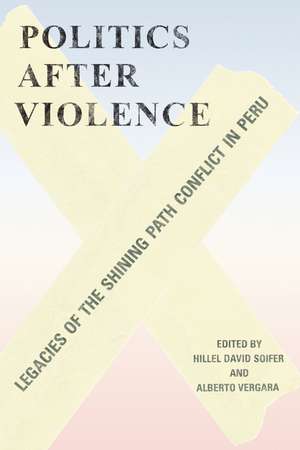Politics after Violence: Legacies of the Shining Path Conflict in Peru
Editat de Hillel Soifer, Alberto Vergaraen Limba Engleză Hardback – 14 ian 2019
This collection of original essays by leading international experts on Peruvian politics, society, and institutions explores the political and institutional consequences of Peru’s internal armed conflict in the long 1980s. The essays are grouped into sections that cover the conflict itself in historical, comparative, and theoretical perspectives; its consequences for Peru’s political institutions; its effects on political parties across the ideological spectrum; and its impact on public opinion and civil society. This research provides the first systematic and nuanced investigation of the extent to which recent and contemporary Peruvian politics, civil society, and institutions have been shaped by the country’s 1980s violence.
Preț: 397.67 lei
Nou
Puncte Express: 597
Preț estimativ în valută:
76.10€ • 79.81$ • 63.35£
76.10€ • 79.81$ • 63.35£
Carte indisponibilă temporar
Doresc să fiu notificat când acest titlu va fi disponibil:
Se trimite...
Preluare comenzi: 021 569.72.76
Specificații
ISBN-13: 9781477317310
ISBN-10: 1477317317
Pagini: 392
Dimensiuni: 152 x 229 x 33 mm
Greutate: 0.74 kg
Editura: University of Texas Press
Colecția University of Texas Press
ISBN-10: 1477317317
Pagini: 392
Dimensiuni: 152 x 229 x 33 mm
Greutate: 0.74 kg
Editura: University of Texas Press
Colecția University of Texas Press
Notă biografică
Hillel David Soifer is an associate professor of political science at Temple University. He is the author of State Building in Latin America.
Alberto Vergara is an assistant professor at the Universidad del Pacífico. He is the author of La Danza Hostil: Poderes subnacionales y Estado central en Bolivia y Perú (1952–2012).
Alberto Vergara is an assistant professor at the Universidad del Pacífico. He is the author of La Danza Hostil: Poderes subnacionales y Estado central en Bolivia y Perú (1952–2012).
Cuprins
- Preface
- Introduction: Leaving the Path Behind (Hillel David Soifer and Alberto Vergara)
- Chapter 1. Shining Path: The Last Peasant War in the Andes (José Luis Rénique and Adrián Lerner)
- Chapter 2. Civil Wars and Their Consequences: The Peruvian Armed Conflict in Comparative Perspective (Livia Isabella Schubiger and David Sulmont)
- Chapter 3. From Oligarchic Domination to Neoliberal Governance: The Shining Path and the Transformation of Peru’s Constitutional Order (Maxwell A. Cameron)
- Chapter 4. The Internal Armed Conflict and State Capacity: Institutional Reforms and the Effective Exercise of Authority (Hillel David Soifer and Everett A. Vieira III)
- Chapter 5. Impact and Legacies of Political Violence in Peru’s Public Universities (Eduardo Dargent and Noelia Chávez)
- Chapter 6. Peace for Whom? Legacies of Gender-Based Violence in Peru (Jelke Boesten)
- Chapter 7. Indigenous Activism and Human Rights NGOs in Peru: The Unexpected Consequences of Armed Conflict (Maritza Paredes)
- Chapter 8. Political Violence and the Defeat of the Left (Paula Muñoz)
- Chapter 9. From a Partisan Right to the Conservative Archipelago: Political Violence and the Transformation of the Right-Wing Spectrum in Contemporary Peru (Alberto Vergara and Daniel Encinas)
- Chapter 10. Public Opinion, the Specter of Violence, and Democracy in Contemporary Peru (Arturo Maldonado, Jennifer L. Merolla, and Elizabeth J. Zechmeister)
- Chapter 11. Contested Memories of the Peruvian Internal Armed Conflict (Paulo Drinot)
- Conclusion (Steven Levitsky)
- Works Cited
- Contributors
- Index
Recenzii
Politics after Violence offers some fruitful hypotheses to test comparatively: Do civil conflicts build capacity in certain state institutions? Do they weaken some sectors of civil society (e.g., grassroots organizations) while strengthening others (e.g., human rights groups)? And do they move public opinion to the right?
Studying the legacy of violence [in Politics after Violence] allows us to understand the legacies of the conflict: changes of constitutional regime, implementation of neoliberal policies, human rights violations situated within the internal armed conflict, the emergence (and tolerance) of new forms of civil authoritarianism, and so on.
This volume makes an invaluable contribution to the study of Peruvian politics. It has broad impact across several research programmes on civil war, democracy, public policy, social movements, political parties, state capacity and the politics of memory...this volume is an essential read for scholars and students in political science. The analysis contributes substantively and broadly across multiple literatures and addresses longer-term impacts, causal complexity, and contingency.
Descriere
In this collection of original essays, leading international scholars offer the first wide-ranging, nuanced assessment of the political and social legacies of the violence that roiled Peru between 1980 and 1994.
